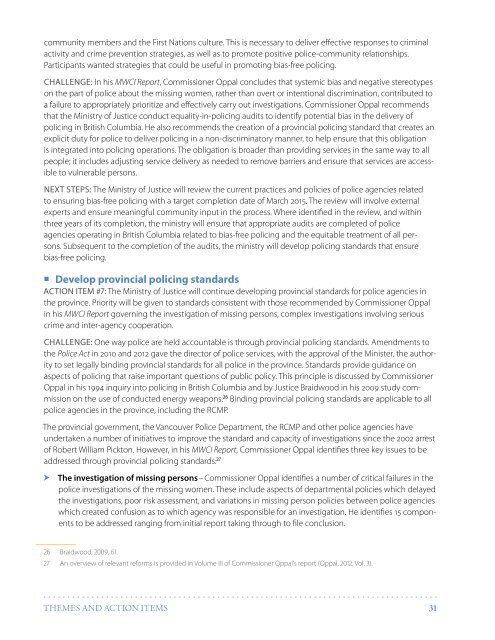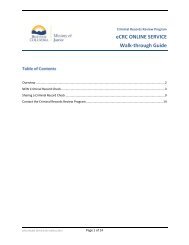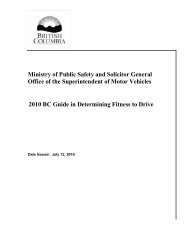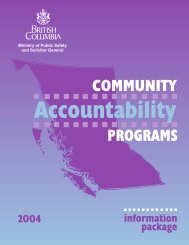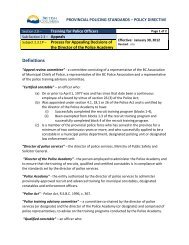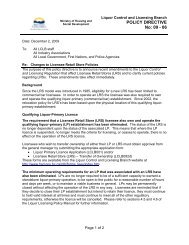BC Policing and Community Safety Plan - Ministry of Justice ...
BC Policing and Community Safety Plan - Ministry of Justice ...
BC Policing and Community Safety Plan - Ministry of Justice ...
Create successful ePaper yourself
Turn your PDF publications into a flip-book with our unique Google optimized e-Paper software.
community members <strong>and</strong> the First Nations culture. This is necessary to deliver effective responses to criminalactivity <strong>and</strong> crime prevention strategies, as well as to promote positive police-community relationships.Participants wanted strategies that could be useful in promoting bias-free policing.CHALLENGE: In his MWCI Report, Commissioner Oppal concludes that systemic bias <strong>and</strong> negative stereotypeson the part <strong>of</strong> police about the missing women, rather than overt or intentional discrimination, contributed toa failure to appropriately prioritize <strong>and</strong> effectively carry out investigations. Commissioner Oppal recommendsthat the <strong>Ministry</strong> <strong>of</strong> <strong>Justice</strong> conduct equality-in-policing audits to identify potential bias in the delivery <strong>of</strong>policing in British Columbia. He also recommends the creation <strong>of</strong> a provincial policing st<strong>and</strong>ard that creates anexplicit duty for police to deliver policing in a non-discriminatory manner, to help ensure that this obligationis integrated into policing operations. The obligation is broader than providing services in the same way to allpeople; it includes adjusting service delivery as needed to remove barriers <strong>and</strong> ensure that services are accessibleto vulnerable persons.NEXT STEPS: The <strong>Ministry</strong> <strong>of</strong> <strong>Justice</strong> will review the current practices <strong>and</strong> policies <strong>of</strong> police agencies relatedto ensuring bias-free policing with a target completion date <strong>of</strong> March 2015. The review will involve externalexperts <strong>and</strong> ensure meaningful community input in the process. Where identified in the review, <strong>and</strong> withinthree years <strong>of</strong> its completion, the ministry will ensure that appropriate audits are completed <strong>of</strong> policeagencies operating in British Columbia related to bias-free policing <strong>and</strong> the equitable treatment <strong>of</strong> all persons.Subsequent to the completion <strong>of</strong> the audits, the ministry will develop policing st<strong>and</strong>ards that ensurebias-free policing.•¡Develop provincial policing st<strong>and</strong>ardsACTION ITEM #7: The <strong>Ministry</strong> <strong>of</strong> <strong>Justice</strong> will continue developing provincial st<strong>and</strong>ards for police agencies inthe province. Priority will be given to st<strong>and</strong>ards consistent with those recommended by Commissioner Oppalin his MWCI Report governing the investigation <strong>of</strong> missing persons, complex investigations involving seriouscrime <strong>and</strong> inter-agency cooperation.CHALLENGE: One way police are held accountable is through provincial policing st<strong>and</strong>ards. Amendments tothe Police Act in 2010 <strong>and</strong> 2012 gave the director <strong>of</strong> police services, with the approval <strong>of</strong> the Minister, the authorityto set legally binding provincial st<strong>and</strong>ards for all police in the province. St<strong>and</strong>ards provide guidance onaspects <strong>of</strong> policing that raise important questions <strong>of</strong> public policy. This principle is discussed by CommissionerOppal in his 1994 inquiry into policing in British Columbia <strong>and</strong> by <strong>Justice</strong> Braidwood in his 2009 study commissionon the use <strong>of</strong> conducted energy weapons. 26 Binding provincial policing st<strong>and</strong>ards are applicable to allpolice agencies in the province, including the RCMP.The provincial government, the Vancouver Police Department, the RCMP <strong>and</strong> other police agencies haveundertaken a number <strong>of</strong> initiatives to improve the st<strong>and</strong>ard <strong>and</strong> capacity <strong>of</strong> investigations since the 2002 arrest<strong>of</strong> Robert William Pickton. However, in his MWCI Report, Commissioner Oppal identifies three key issues to beaddressed through provincial policing st<strong>and</strong>ards: 27The investigation <strong>of</strong> missing persons – Commissioner Oppal identifies a number <strong>of</strong> critical failures in thepolice investigations <strong>of</strong> the missing women. These include aspects <strong>of</strong> departmental policies which delayedthe investigations, poor risk assessment, <strong>and</strong> variations in missing person policies between police agencieswhich created confusion as to which agency was responsible for an investigation. He identifies 15 componentsto be addressed ranging from initial report taking through to file conclusion.26 Braidwood, 2009, 61.27 An overview <strong>of</strong> relevant reforms is provided in Volume III <strong>of</strong> Commissioner Oppal’s report (Oppal, 2012, Vol. 3).THEMES AND ACTION ITEMS 31


